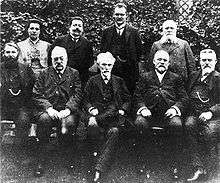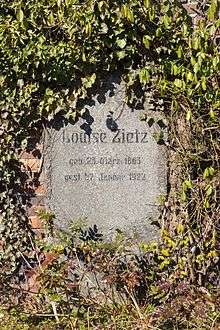Luise Zietz


Luise Zietz (1865-1922) was a German socialist and feminist.[1] She was the first woman to occupy a leading party post in Germany.[2] She also helped bring the socialist women's movement into the Social Democratic Party of Germany, although some of the female leaders felt that she let the male leaders co-opt their independence.[1]
In 1908, the same year the government legalized women's participation in politics, she became the first woman appointed to the executive committee of the Social Democratic Party of Germany.[1][3] She later nominated Marie Juchacz for a paid position by the party as the Cologne women's secretary in what was then the Upper Rhine province.[3]
She also contributed to International Women's Day.[4][5] In August 1910, an International Women's Conference was organized to precede the general meeting of the Socialist Second International in Copenhagen, Denmark.[6] Inspired in part by American socialists' actions, Zietz proposed the establishment of an annual International Woman's Day (singular) and was seconded by fellow socialist and later communist leader Clara Zetkin, although no date was specified at that conference.[4][5] Delegates (100 women from 17 countries) agreed with the idea as a strategy to promote equal rights including suffrage for women.[7] The following year on March 19, 1911 IWD was marked for the first time, by over a million people in Austria, Denmark, Germany, and Switzerland.[8]
Zietz and Friedrich Ebert, Hugo Haase, Hermann Molkenbuhr and Hermann Müller attended the Vienna Socialist Conference of 1915 representing the Social Democratic Party of Germany.[9]
In 1917 she was one of the main agitators in favor of a split in the party, which led to the formation of the Independent Social Democratic Party of Germany.[1] She then became a leader in the creation of that party's women's movement.[1]
She was one of the first female members of the new Reichstag in 1919.[1]
References
- 1 2 3 4 5 6 Joseph A. Biesinger (1 January 2006). Germany: A Reference Guide from the Renaissance to the Present. Infobase Publishing. pp. 755–. ISBN 978-0-8160-7471-6.
- ↑ All Power to the Councils!: A Documentary History of the German Revolution of 1918–1919. PM Press. 1 June 2012. pp. 262–. ISBN 978-1-60486-737-4.
- 1 2 Jennifer Striewski (Bonn) (8 March 2013). "Marie Juchacz (1879-1956), Begründerin der Arbeiterwohlfahrt". Landschaftsverband Rheinland (LVR), Cologne. Retrieved 11 November 2014.
- 1 2 Temma Kaplan, "On the Socialist Origins of International Women's Day", Feminist Studies, 11/1 (Spring, 1985)
- 1 2 "History of International Women's Day". United Nations. Retrieved May 26, 2012.
- ↑ Rochelle Goldberg Ruthchild, "From West to East: International Women’s Day, the First Decade”, Aspasia: The International Yearbook of Central, Eastern, and Southeastern European Women's and Gender History, vol. 6 (2012): 1-24.
- ↑ "About International Women's Day". Internationalwomensday.com. March 8, 1917. Retrieved February 26, 2016.
- ↑ "United Nations page on the background of the IWD". Un.org. Retrieved March 8, 2012.
- ↑ Olga Hess Gankin and H.H. Fisher eds, The Bolsheviks and the First World War: the origins of the Third International Stanford University Press, 1940 p.284